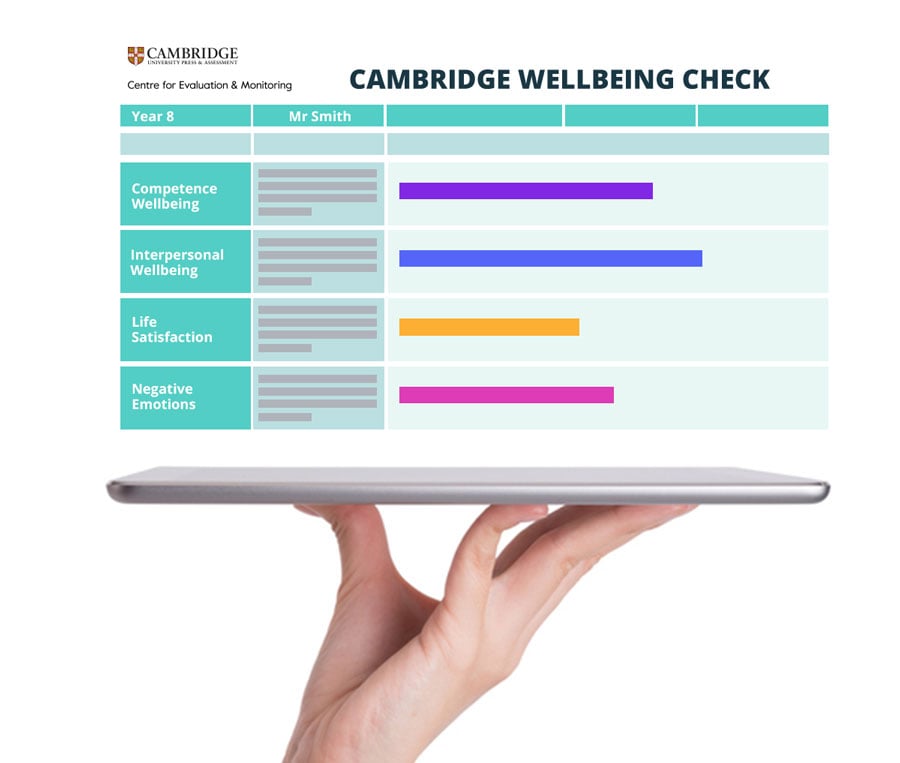The Cambridge
Wellbeing Check
a student-led assessment
Are your students in the best position to flourish?
Wellbeing has a real impact on students’ experience of school, and how well they perform. The Cambridge Wellbeing Check is here to give you a clear picture of wellbeing at your school and support you in helping students aged 7-18 feel their best.
The Cambridge Wellbeing check equips you with the tools you need to evaluate, explore, teach and promote wellbeing – and have a lasting, positive impact.
Based on published research by the University of Cambridge, the Cambridge Wellbeing Check is a quick and intuitive, student-led digital assessment. Instant feedback and reports empowers you to have a positive, lasting impact on your students’ wellbeing. Give your students the support they need to flourish and do better throughout their learning journey.
Why use the Cambridge Wellbeing Check?
Promote positive student wellbeing with a clear understanding of how your students feel, and where they need support.
![]()
Get a more complete picture of your students, with greater insight into their academic success.
![]()
Identify areas where students are feeling good and doing well, and when and where they need additional support.
![]()
Evaluate how students are feeling throughout the academic year.
![]()
Understand how students are feeling during stressful periods – such as examination time.
![]()
Compare your students at an individual, class and year-group level.
Find out more

Why do you need it?
The Cambridge Wellbeing Check gives you unprecedented insight into how your students are feeling. It assesses students’ day-to-day wellbeing, and helps you monitor the times when they might be feeling low, stressed, pressured by exams, or coping with change.
You can teach, explore and evaluate your students' wellbeing, get actionable reports to help you improve your teaching, and help students feel good and do better.
How does it work?
The Cambridge Wellbeing Check is a simple, student-led assessment that takes about 20 minutes of screen time (it works on desktop, tablet and mobile devices). The test’s been designed specifically to work as part of existing wellbeing or pastoral care teaching, complementing and enhancing what you’re already doing. It’s not a tool to measure or diagnose a student’s mental health. The reports help all teachers see a complete picture of wellbeing at individual, class and even whole-school levels.
Multiple students can complete the Cambridge Wellbeing Check at the same time. The assessment is flexible and free from paperwork and marking - it even comes with easy to integrate follow-up lesson plans.
You can use Cambridge Wellbeing Check as much as you want or need to over the course of the academic year. With an instant wellbeing snapshot, it’s designed to help you track, monitor and evaluate wellbeing throughout students’ learning journeys, such as in the run-up to exams, starting a new year or school, or any other significant milestones.
Tools to support you
After your students have taken the Cambridge Wellbeing Check, you’ll automatically get:
Easy-to-understand reports
Get a clear picture of how each of your students is doing across four areas of wellbeing:
- interpersonal wellbeing,
- life satisfaction,
- competence wellbeing,
- negative emotions.
You’ll be able to look at each student's wellbeing over time and see how this changes over the year, giving you the opportunity to put in place targeted support and interventions.
Longer term, you’ll also be able to compare groups or classes in your school and identify trends across the four wellbeing focus areas covered in the check.
Supporting lesson plans
Understand what you need to do to promote wellbeing in the classroom.
The supporting lesson plans provide guidance that you can use straight away in wellbeing or pastoral care lessons, and are tailored to your students’ wellbeing check results.

Backed by research
The Cambridge Wellbeing Check was developed from a survey developed by researchers Dr Ros McLellan, Maurice Galton, Susan Steward and Charlotte Page in the University of Cambridge’s Faculty of Education. The original survey was created as part of a study examining the role of creative initiatives in fostering wellbeing, which was funded by the international creative learning foundation Creativity, Culture and Education.
We’ve worked with Dr McLellan and her colleagues to refine the questionnaire and bring it to life as a digital check and supporting wellbeing lesson plans.


